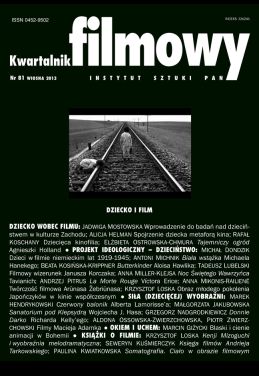Czas dzieciństwa i dojrzewania. Dwie epoki heroiczne w "Sanatorium pod klepsydrą".
The time of childhood and adolescence - two heroic epochs in the "Hourglass Sanatorium".
Author(s): Małgorzata JakubowskaSubject(s): Theatre, Dance, Performing Arts
Published by: Instytut Sztuki Polskiej Akademii Nauk
Keywords: Has Wojciech Jerzy
Summary/Abstract: "The Hourglass Sanatorium" by Wojciech Jerzy Has tells of a return to the time of childhood and the age of adolescence. And yet it is not a story woven of memories understood in a typical way. It is a film about an expedition back into time of childhood. For Bruno Schulz, the author of the original novel, maturing into childhood is an existential challenge for every human being. Though this postulate sounds like a part of psychoanalytic therapy, we do not get superficial Freudianism in Schulz’s prose or in Has’ film. Freud wanted to release the patient from the burden of childhood and offer him the freedom in the present, once the patient dealt with the trauma of early experiences. However, in Schulz’s vision the desire to return to the past dominates, because only there we can find true freedom – in a child’s unfettered creativity. In "The Hourglass Sanatorium" human personality and philosophy of time crystallize around parental figures. Has repeats after Schulz, that death and birth are simply two sides of life, just as the figures of Mother and Father. The grave and the womb are sources of time from which everything flows, and to which everything must return. No love is the first love, and no death is final.
Journal: Kwartalnik Filmowy
- Issue Year: 2013
- Issue No: 81
- Page Range: 193-203
- Page Count: 11
- Language: Polish

